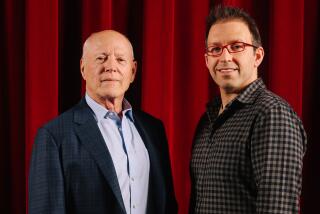Corona del Mar’s Abracadabra Boy Busy Learning Tricks of the Trade
- Share via
CORONA DEL MAR--What ever becomes of all those rabbits magicians pull so effortlessly from their hats?
Well, in at least one case, the creatures move on to spawn other magicians. When he was 11, Erik Seidenglanz was taken to see magician Harry Blackstone Jr. perform.
“He did an effect where he produced a rabbit, and he asked if anyone in the audience wanted it, and, of course, all the kids’ hands flew up,” Erik recalled. “But I had my hand up before he even said it, and got it. I have it still.”
Along with the rabbit, the Corona del Mar youth, now 14, left with an abiding and exceptional passion for magic. At 12, he was one of the youngest people accepted into Hollywood’s Magic Castle junior program, which typically doesn’t even consider applicants younger than 14.
Last summer at the annual convention in Orlando, Fla., of the IBM--the International Brotherhood of Magicians, naturally--Erik competed against magicians from 58 nations, coming in second for entrants less than 20 and sixth overall against all ages. He has scored as impressively in other competitions.
Erik looks like a normal kid--in the slight, precocious Macaulay Culkin mold--but he has a disquieting way of making Hershey kisses disappear and reappear or of making Lego robots materialize from nowhere.
As he displayed a couple of his skills recently, seated on his family’s living room floor, he apologized, saying he’s usually a lot smoother doing his set act in front of a large crowd.
According to professional magician Greg Wilson--who has taught Erik--the youth’s sleight-of-hand skills are impressive, but they are not the greatest of his talents.
“He shows a surprising maturity in both his magic and his personality,” Wilson said. “He’s already becoming himself onstage, and that’s what matters most. He transcends the magic, filters the things he’s learned through his own unique identity, and closes the distance between himself and the audience. You don’t see most adults on the road, let alone kids, having the moxie or personality he does.”
*
Erik developed that moxie on the streets. We’re not exactly talking mean streets here: He does live in Corona del Mar. But within a week of getting his first magic book, he was trundling a crate up the block to the Pacific Coast Highway, where he set up business in front of a frozen yogurt shop.
For the first few hours of that Saturday afternoon, he just kept fanning cards over his makeshift table top, hoping someone would ask him what he was doing.
“I was kind of nervous and didn’t want to have to say anything to anybody,” Erik recalled. “I just set up and tried to show off so someone would come up and ask me what I was doing, but no one paid any attention. So I finally got up the courage to ask one guy, ‘Would you like to see a card trick?’ And he said ‘Sure.’ Then he dragged a bunch of other people over, saying, ‘You’ve got to see this!’ After that it was really easy for me.”
He came home from that first day with $78 in his pocket, which encouraged him to head back that evening.
“I was really against that,” said his mother, Cheryl Miller. “But he was determined to go when it got dark, because there was a bigger crowd coming in for yogurt then. I thought that as soon as he headed up the street in the dark he’d be scared. Well, he went out the front door, and about a minute later he was back saying, ‘Would you walk with me up to the corner? It’s dark.’ So I went up with him and parked myself across the street on the bus stop bench watching, the protective mother.”
At the relating of this anecdote, Erik looked as if he wouldn’t mind doing a vanishing trick himself. It is a mom prerogative, though, to embarrass her kids.
He spent the rest of that summer working on the corner, bringing home $30 to $80 a day. Asked whether he’s started buying real estate yet, he said:
“Kind of. I’ve built five treehouses. Usually they’re in a park down the street. The last one was about 35 feet high, built on three levels, and we could get about seven kids on one floor.
“They only last about two weeks, though, because the city comes with tree trimmers and cuts them down. We’ve always wanted to be there when they were, with all our water balloons and water guns. But it always seems they hit on the one day we’re not there.” *
He’s a clever, inventive kid, but he finds that isn’t necessarily an advantage among his classmates. Every time he winds up in a newspaper--for building an award-winning sandcastle, say, or going to perform for the President--all he gets in class are snide remarks and crayons flying his way.
His mom says his passion for magic has increased his attention for detail in school, but he admits it also distracts at times.
“Sometimes I’m thinking about a magic problem, and I can’t get it out of my head to concentrate on schoolwork,” he said. “If I have a magic competition coming up, school can be boring, but it’s OK.”
He never did meet the President, by the way, since the White House luncheon he was scheduled to perform at was canceled at the last minute.
“I got to perform at the White House in a way,” he said. “When we went by there, I stuck my foot in the gate and did a card trick.”
He has performed several times at the exclusive Magic Castle, the private club that has been the venue for magicians for over three decades. As a member of its junior program, he also goes to workshops where older magicians critique his work.
“It is very, very, very difficult to get into the program,” said its director, Diana Zimmerman. “Most of the club’s members couldn’t pass the tests these kids have to to get in, because we want only the most devoted ones, and Erik is pretty remarkable.”
He rarely performs on the street corner anymore, doing it now only when he’s trying out a new routine or working on the comedic timing of his material, which he writes himself.
“When I’m preparing for a competition or a performing date, I’ll work eight hours a day on my routine,” he said. “Last Easter break, for two weeks I worked eight or nine hours a day on one routine, over and over. I set up a video camera in the living room, taping from all angles, then watching it back for mistakes.”
The competitions, his mom said, are so stressful that her husband can’t even bear to watch them. Erik seems to take them in stride, though.
“I used to be nervous, where I’d shake a little bit or my heart would start running,” Erik said. “But I don’t get really nervous anymore. Instead of shaking I get dry-mouth. So before I go on I take one of those plastic lemons or limes full of concentrated juice and take a huge squirt of it. That helps.”
To work off some of the tension from competing, he and another young magician friend will go to an arcade and whack the puck around on an air hockey table.
*
Though not yet in high school, Erik is already planning his life.
“I’d like to do magic as a career, though I know I’ll have to do a lot more to make it work as a career because some make good money, but most magicians have to scrounge to get by. If it doesn’t work out as a full-time career, I’ll have to have something else as a job and then have magic as a second job. It’s what I want to do full time, though.”
“I like appearing in front of people, and I like to fool them and leave them wondering how it was done,” he said. “I like to be creative and having an act that’s something new, so that if another magician sees me, he’ll never have seen it before. Magic is the most fun.”
Though he likes the mystery of magic, he wouldn’t mind more of it in everyday life.
“When I look at anything now, I’m thinking about how I can turn it into a trick,” Erik said. “It’s a different way of thinking, after you know a lot about magic. I think if all the people in the world knew tons about magic, I’d almost believe that our technology would be a lot farther along than it is now.”
More to Read
The biggest entertainment stories
Get our big stories about Hollywood, film, television, music, arts, culture and more right in your inbox as soon as they publish.
You may occasionally receive promotional content from the Los Angeles Times.










